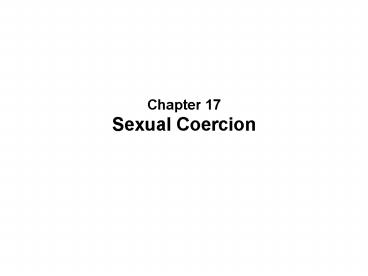Chapter 17 Sexual Coercion - PowerPoint PPT Presentation
Title:
Chapter 17 Sexual Coercion
Description:
Chapter 17 Sexual Coercion Types of Rape Stranger rape Acquaintance rape Date rape Statutory rape Prevalence of Rape 1 in 6 women, 3% of men Underreported for many ... – PowerPoint PPT presentation
Number of Views:135
Avg rating:3.0/5.0
Title: Chapter 17 Sexual Coercion
1
Chapter 17Sexual Coercion
2
Types of Rape
- Stranger rape
- Acquaintance rape
- Date rape
- Statutory rape
3
Prevalence of Rape
- 1 in 6 women, 3 of men
- Underreported for many reasons
- Victims self-blame or denial
- Mistrust of police, legal system
- Fear of retaliation from rapist
- Concern about publicity
4
Incidence of Rape by Sex of Victim
5
False Beliefs About Rape
- Women cant be raped if they dont want to be
- Women say no when they mean yes
- Many women cry rape
- All women want to be raped
- Rapists are obviously mentally ill
- Men cant control their sexual urges
6
Psychosocial Basis of Rape
- Rape frequency influenced by the nature of
relations between the sexes - Status of women
- Boys attitudes during developmental years
- Rape-prone societies
- Societies with no rape
- Stereotyped gender roles
- Peer group acceptance
7
Psychosocial Basis of RapeImpact of Media
- Heightens acceptance of sexual violence
- Heightens likelihood of coercive sex
- Physiologic findings inconsistent
8
Characteristics of Rapists
- Embrace male-dominance
- Anger toward women
- Alcohol may contribute
- Self-centered, less sensitive
- History of progressively more violent sexual
offenses
9
Characteristics of Female Rape Victims
- 50 under age of 18
- Cultural differences in reporting
- Low SES may confer greater risk
- Victims of childhood sexual abuse at increased
risk for adult sexual revictimization
10
Age Breakdown of Women Rape Victims
11
Acquaintance RapeRole of Perceptions and
Communication
- Occur in 3 out of 4 rapes
- Sexual scripts
- Misinterpretations and double messages
- Nonverbal communication
- Justification
12
Date Rape Drugs
- Rohyphnol (roofies) sedative causing muscle
relaxation and amnesia - Gamma hydroxybutyrate (GHB) central nervous
system depressant - Ketamine hydrochloride (Special K) central
nervous system depressant
13
Wartime Rape
- U.N. 1996 Declaration crime of war
- Motivated by attempts to dominate, humiliate,
control - Destroy familial and societal bonds
- Terrorize population
14
Aftermath of Rape
- Initial feelings of shame, anger, fear, guilt,
powerlessness - Self-blame
- Physical symptoms frequently occur
- Impaired sexual functioning
- PTSD, distress developed after trauma
- Less severe repercussions if counseling begun
ASAP
15
Rape and Sexual Assault of Males
- Although vast majority of sexual assault victims
are women, men are also targets of rape - Men less likely than women to report rape
- Gay men, prison inmates, and prisoners of war
more likely to be raped
16
Sexual Abuse of Children
- Sexual contact with a child is always coercive
because children cannot give informed consent - Child-sexual abuse adult sexual contact with a
child - Incest with a relative
- Pedophilia or molestation with a non-relative
17
Sexual Abuse of Children
- Prevalence
- Girls 20-33
- Boys 9-16
- Brother-sister and first cousin incest is most
common - Father-daughter reported more and has greater
negative impact
18
Characteristics of Child Sexual Abusers
- Mostly heterosexual males
- Cover spectrum of social classes, religions,
ethnicity and education - Often times are lonely, shy
- Poor interpersonal skills
- Alcoholism severe marital problems sexual
difficulties and poor emotional adjustment
19
Sexual Abuse of ChildrenRecovered Memories
- Many abuse victims do not remember documented
abuse - Controversy Are memories planted by therapists?
20
Sexual Abuse of ChildrenPedophiles in Cyberspace
- The Internet provides increased opportunities to
take advantage of children - First, gain childs trust then, try to arrange a
meeting - 2009 Child Online Protection Act
- Prevention
21
Effects of Child Sexual Abuse
- Often affects intimate adult relations
- Low self esteem, PTSD, detrimental parenting
practices - Sex difference
- Variety of treatment programs
22
Preventing Child Sexual Abuse
- Present prevention-oriented material at young age
- Explain Okay and Not Okay touches to children
- Encourage children to believe they have rights
- Encourage communication be immediate when in
uncomfortable situations - Discuss strategies for getting away from
uncomfortable situations
23
Sexual Harassment
- Unwanted sexual attention in the workplace or
academic setting - Prohibited by Title VII of the 1964 Civil Rights
Act - Two types verbal or physical
- Quid pro quo
- Hostile or offensive environment
24
Sexual HarassmentSeverity Levels
- Mild -Sexual or sexist remarks
- -Unwelcome intrusion
- Intermediate -Graphic comments
- Severe -Requiring sexual services
25
Same-Sex Sexual Harassment
- Recent increase in same-sex sexual harassment
claims - Difficult to pursue legally
- Federal law narrowly interpreted as between men
and women
26
Sexual HarassmentEffects on the Victim
- Financial loss
- Psychological reactions
- Physical symptoms
- Personal relationships
27
Dealing with Sexual Harassment
- If assaulted, file criminal charges
- If not assaulted, confront harasser
- Discuss with supervisor
- Discuss appropriately with coworkers
- File official complaint or lawsuit
28
Sexual Harassment in Academic Settings
- Coercion focuses on grades, letters of
recommendation, work, or research opportunities - Many colleges and universities ban
professor-student romances - Incidence
- 20-40 undergraduate women 9-29 men
undergraduate - 30-50 graduate women

